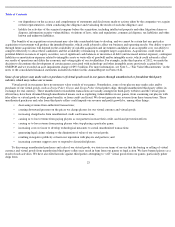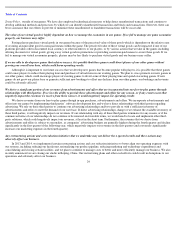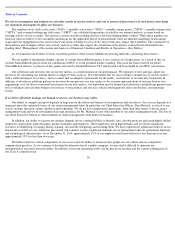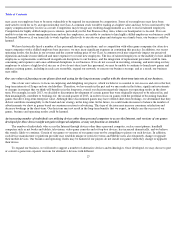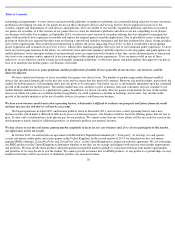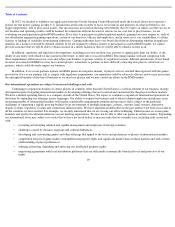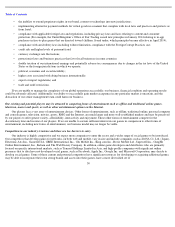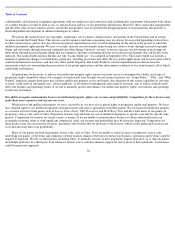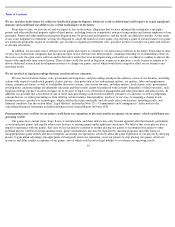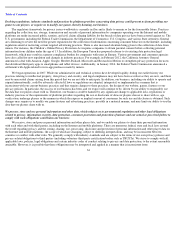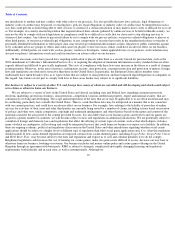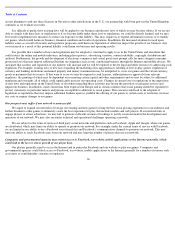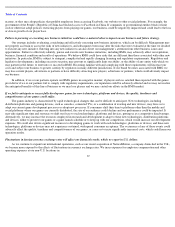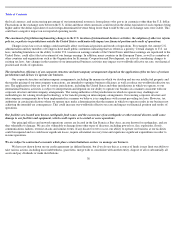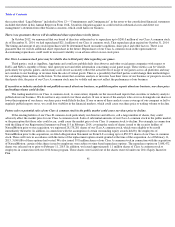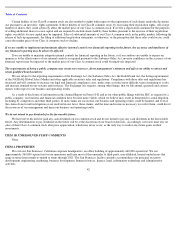Zynga 2014 Annual Report Download - page 35
Download and view the complete annual report
Please find page 35 of the 2014 Zynga annual report below. You can navigate through the pages in the report by either clicking on the pages listed below, or by using the keyword search tool below to find specific information within the annual report.
Table of Contents
confidentiality and invention assignment agreements with our employees and contractors and confidentiality agreements with parties with whom
we conduct business in order to limit access to, and disclosure and use of, our proprietary information. However, these contractual arrangements
and the other steps we have taken to protect our intellectual property may not prevent the misappropriation of our proprietary information or
deter independent development of similar technologies by others.
We pursue the registration of our copyrights, trademarks, service marks, domain names, and patents in the United States and in certain
locations outside the United States. This process can be expensive and time-consuming, may not always be successful depending on local laws
or other circumstances, and we also may choose not pursue registrations in every location depending on the nature of the project to which the
intellectual property rights pertain. We may, over time, increase our investments in protecting our creative works through increased copyright
filings and our brands through increased trademark and other filings. Likewise, we may, over time, increase our investment in protecting our
innovations through increased patent filings that are expensive and time-consuming and may not result in issued patents that can be effectively
enforced. The Leahy-Smith America Invents Act (the “Leahy-Smith Act”) was adopted in September 2011. The Leahy-Smith Act includes a
number of significant changes to United States patent law, including provisions that affect the way patent applications will be prosecuted, which
could be detrimental to investors, and may also affect patent litigation. The Leahy-Smith Act and its implementation could increase the
uncertainties and costs surrounding the prosecution of our patent applications and the enforcement or defense of our issued patents, all of which
could harm our business.
Litigation may be necessary to enforce our intellectual property rights, protect our trade secrets or determine the validity and scope of
proprietary rights claimed by others. For example, we historically have brought several actions to protect our “Zynga Poker,” “Ville,” and “With
Friends” franchises against third-party uses of those intellectual property assets and brands. Any litigation of this nature, regardless of outcome
or merit, could result in substantial costs, adverse publicity, or diversion of management and technical resources, any of which could adversely
affect our business and operating results. If we fail to maintain, protect and enhance our intellectual property rights, our business and operating
results may be harmed.
Our ability to acquire and maintain licenses to intellectual property, affects our revenue and profitability. Competition for these licenses may
make them more expensive and increase our costs.
While most of the intellectual property we use is created by us, we have also acquired rights to proprietary intellectual property. We have
also obtained rights to use intellectual property through licenses and service agreements with third parties. We use licensed intellectual property
as a creative asset in certain games such as Looney Tunes Dash!, NFL Showdown and Hit It Rich! Slots and have built many of our games on
proprietary source code, such as Unity. Proprietary licenses typically limit our use of intellectual property to specific uses and for specific time
periods. Competition for licenses for creative assets is intense. If we are unable to maintain these licenses or obtain additional licenses on
reasonable economic terms or with significant commercial value, our revenue and profitability may be adversely impacted. Competition for
these licenses may also increase the advances, guarantees and royalties that we must pay to the licensor, which could significantly increase our
costs and adversely affect our profitability.
Many of our games are built on propriety source code, such as Unity. If we are unable to renew licenses to proprietary source code
underlying our games, or the terms and conditions of these licenses change at the time of renewal our business, operations and revenue could be
negatively impacted. We rely on third parties, including Unity, to maintain versions of their proprietary engines that allow us to ship our games
on multiple platforms. If a third party from whom we license source code discontinues support for one or more of these platforms, our business
could be negatively impacted.
32



